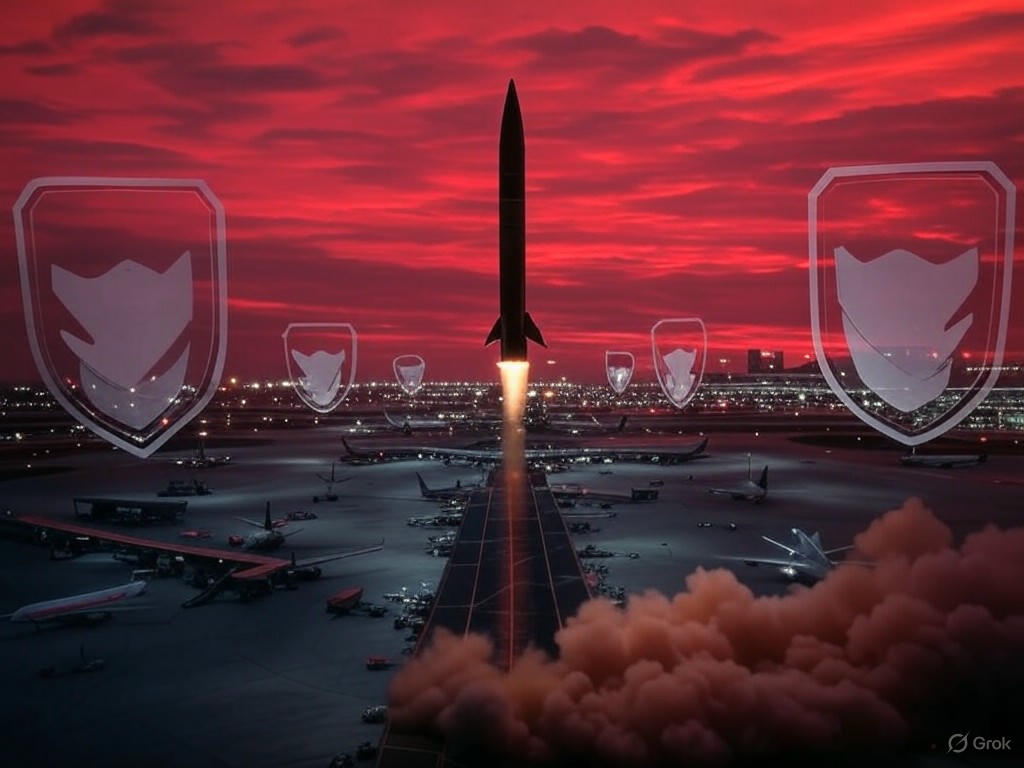
Houthi Missile Threats Escalate Targeting Israeli Airports
Houthi Missile Threats Escalate Targeting Israeli Airports
Recent Houthi Missile Attack Penetrates Israeli Defenses at Ben Gurion Airport
The Houthi missile attack on May 4, 2025, marked a dangerous turning point in regional conflicts, as rebels from Yemen struck the perimeter of Ben Gurion Airport’s main terminal. This incident injured eight Israelis and exposed vulnerabilities in Israel’s air defense systems, raising alarms about the safety of critical infrastructure. Have you ever wondered how such events can ripple through global security networks?
In this Houthi missile attack, a ballistic missile slipped through defenses, creating a large crater near the terminal and damaging nearby roads and vehicles. Despite efforts with advanced systems like THAAD and the Arrow defense, the strike highlighted potential gaps in protection. It’s a stark reminder that even sophisticated technologies aren’t foolproof against evolving threats.
Details of the Houthi Missile Attack
The Houthi missile attack involved a weapon with reported stealth features, capable of traveling over 2,150 kilometers at hypersonic speeds. This level of technology likely contributed to the failure of interception attempts, making it a wake-up call for defense strategies. Imagine the chaos: drivers pulling over as a plume of smoke erupted near one of the world’s busiest airports.
Occurring in the early morning, this was the first time a missile had landed so close to Israel’s main airport, injuring two people en route to shelters. While the casualty count remained relatively low thanks to effective early warning protocols, the event underscores the need for constant vigilance. What might this mean for future Houthi missile attacks and regional stability?
Immediate Impact on Air Travel from the Houthi Missile Attack
Following the Houthi missile attack, Ben Gurion Airport faced immediate disruptions, with operations suspended and flights rerouted. Major airlines like British Airways, Lufthansa, and Air France canceled services for days, reflecting deep concerns about flying into Israeli airspace. This isn’t just about one incident—it’s about how a single Houthi missile attack can halt international connectivity.
The closures affected thousands of passengers, halting train access and closing airport entrances as security teams assessed the damage. For travelers, this might mean rethinking plans or facing delays, showing how such events touch everyday lives. Could this lead to long-term changes in how airlines evaluate risks in conflict zones?
Netanyahu’s Response and Threat of Retaliation
Israeli Prime Minister Benjamin Netanyahu has vowed strong retaliation against the Houthi rebels following this missile attack, tying it to broader tensions since the 2023 Hamas assault. The failure of defense systems has intensified pressure on his administration to act decisively. In a world of proxy wars, how will Israel’s response shape the Middle East?
Israeli Military Preparations Post-Houthi Missile Attack
Reports suggest Israel is mobilizing tens of thousands of reservists, potentially expanding operations beyond Yemen. This preparation indicates a multifaceted approach to the Houthi missile attack and ongoing crises in Gaza, where humanitarian issues persist. It’s a scenario that could escalate quickly, drawing in more players and complicating peace efforts.
The Wider Context: Houthi Involvement in Regional Conflict
The Houthi missile attack is part of a larger pattern, with the group launching strikes since the Gaza conflict began in 2023. Aligned with Hamas, they’ve turned local disputes into a widespread Middle Eastern crisis, targeting both military and civilian sites. This escalation shows how interconnected these conflicts have become.
U.S. and International Response to the Houthi Missile Attack
Under President Trump’s administration, the U.S. has conducted strikes on Houthi targets in Yemen to safeguard the Red Sea. Yet, this successful Houthi missile attack reveals that such efforts haven’t fully neutralized the threat. For international allies, it’s a prompt to reassess strategies and bolster defenses against similar attacks.
Defense System Failure Analysis After the Houthi Missile Attack
The Houthi missile attack exposed flaws in Israel’s multi-layered defense network, including Iron Dome and THAAD. Analysts are probing whether the missile’s speed and stealth features overwhelmed these systems, marking a critical learning opportunity. Houthi missile attack events like this could drive innovations in counter-hypersonic technology.
Key questions include potential operator errors or integration issues, which might have played a role. As nations adapt, we could see faster advancements in radar and interceptors to handle these threats more effectively.
Humanitarian Situation in Gaza
Amid the Houthi missile attack, Gaza’s humanitarian crisis worsens, with a blockade limiting aid and leaving children vulnerable to malnutrition. This backdrop fuels solidarity among groups like the Houthis, who frame their actions as support for Palestinians. It’s a tragic cycle where security and humanitarian needs intersect, often at great human cost.
If you’re following these developments, consider how global responses might alleviate suffering while addressing root causes. True resolution will require balancing defense with diplomacy.
Implications for Regional Security
The Houthi missile attack underscores the growing capabilities of non-state actors and the challenges of defending against them. It highlights risks to civilian infrastructure and the potential for wider escalations in the Middle East. In such a volatile environment, even small incidents can lead to significant shifts.
Key factors include proxy conflicts and technological advancements, which complicate international relations. For policymakers, this is a call to action: how can we foster stability without igniting further unrest?
Economic Impact and Travel Industry Concerns
Beyond security, the Houthi missile attack has hit Israel’s economy hard, disrupting tourism and business travel through Ben Gurion Airport. With flights canceled, sectors like hospitality face setbacks, potentially stalling recovery from prior conflicts. Airlines now grapple with safety versus profitability, a dilemma that affects global routes.
Travelers might hesitate, impacting jobs and investments. If you’re planning a trip, staying informed on advisories could be a smart strategy to navigate these uncertainties.
Looking Ahead: Potential Developments After the Houthi Missile Attack
As tensions simmer, watch for Israel’s military moves, which could target Houthi bases or Iranian supporters. This might either contain the conflict or spark broader confrontations. One thing’s clear: proactive measures are essential.
Military Response to the Houthi Missile Attack
Retaliation options range from precise strikes to larger operations, each carrying risks of escalation. Experts suggest focusing on intelligence to prevent future attacks, turning defense failures into strengths.
Diplomatic Initiatives
Diplomacy could gain momentum, with calls for ceasefires in Gaza and Yemen. International pressure might encourage talks, offering a path to de-escalate the Houthi missile attack’s fallout. Engaging in dialogue could be key to long-term peace.
Defense Technology Adaptations
In response, Israel may enhance early warning systems and develop new tech against hypersonic threats. This evolution could set global standards for missile defense, making regions safer overall.
Conclusion
The Houthi missile attack on May 4, 2025, has amplified concerns about Israeli security and aviation, potentially ushering in a new era of regional instability. As stakeholders respond, the focus shifts to preventing further incidents while addressing humanitarian needs. What are your thoughts on how the world can navigate these challenges?
Stay informed and engaged—share this article, comment below, or explore more on regional conflicts to deepen your understanding. Your insights could spark meaningful discussions on building a more secure future.
References
For more details, refer to these sources:
- “2025 Houthi attack on Tel Aviv airport” from Wikipedia: Wikipedia Article
- Video footage and analysis: YouTube Video
- Related blog on security: Black Arrow Cyber Blog
- Dataset reference: Hugging Face dataset – Rp_CommonC_500
- Frequency analysis: English Wikipedia Words Frequency
- Additional column: Dog Diamond Blog
Houthi missile attack, Ben Gurion Airport, Israeli defense systems, flight cancellations, Yemen conflict, Middle Eastern crisis, Houthi rebels, ballistic missile, Israeli security, international aviation safety







